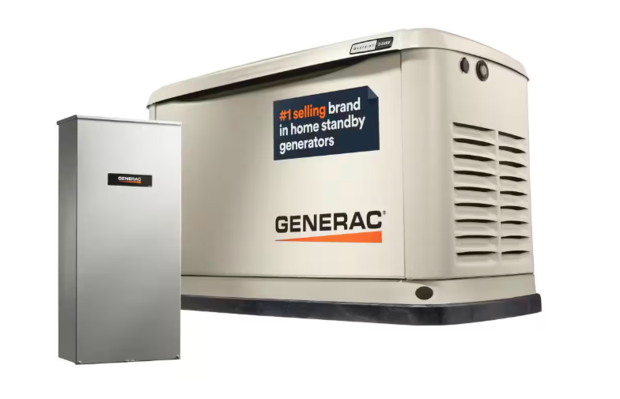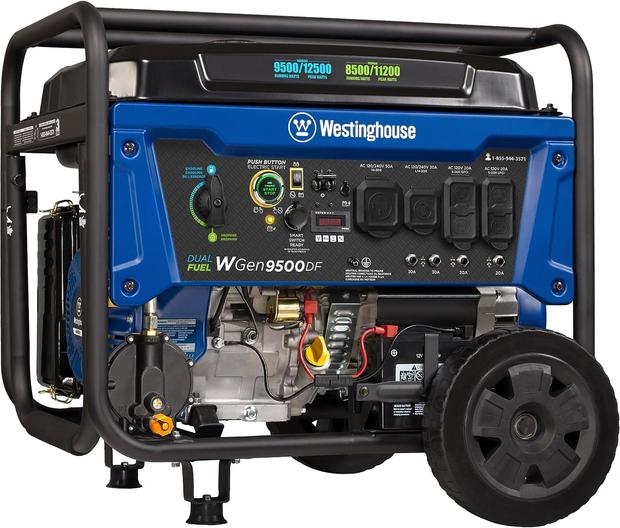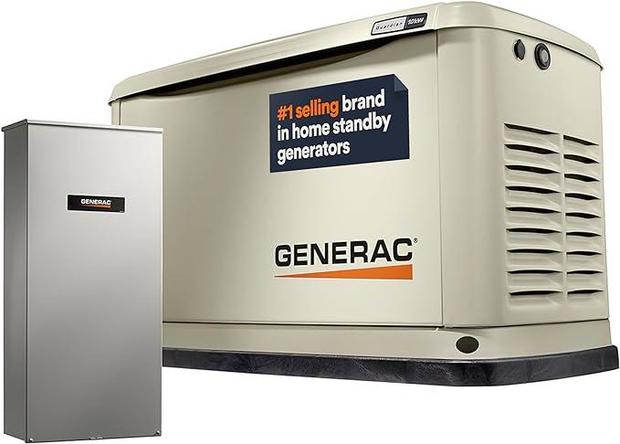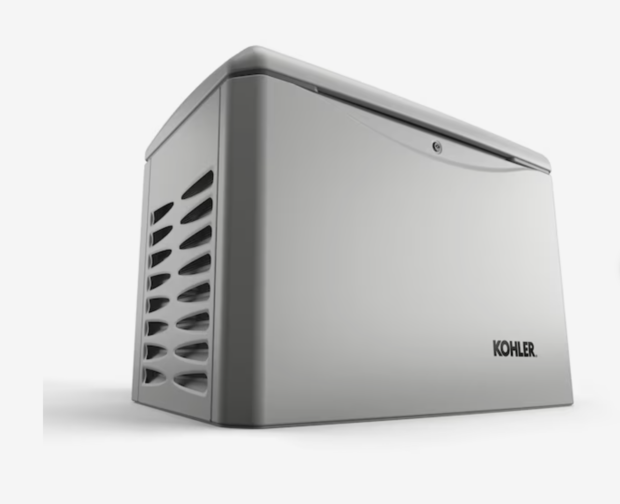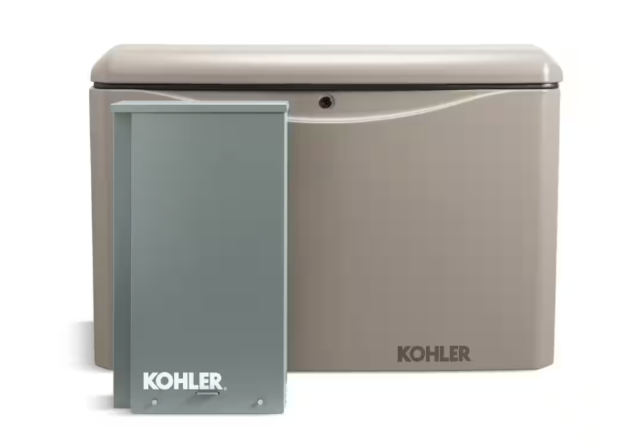The 5 best home generators to prepare for hurricane season
When a storm or hurricane hits, there's a chance your home could lose power -- for hours, a day or even weeks. One way to prepare for this is to install a standby home generator that automatically activates as soon as power is lost.
A standby home generator is more expensive than a portable power bank, but most models can power your entire home, including all of your major appliances, lights, heating or air conditioning.
- Best home generator overall: Generac Guardian 24,000-watt whole-house generator
- Best portable home generator: Westinghouse W Gen 9500DF 12500-watt dual fuel home backup portable generator
- Best value home generator: Generac 7172 10kW home standby generator
- Best generator for most single-family homes: Kohler RCA 26kW air-cooled whole-house generator
- Best generator for smaller homes: Kohler RCA 14kW air-cooled whole-house generator
CBS Essentials covers all things homes and outdoor living -- including the five best propane grills in 2024, the five best wood pellet grills in 2024, the five best charcoal grills in 2024, the six best smart grills in 2024 and the best ideas for a spring patio makeover.
Best standby and portable home generators in 2024
Our team of experts has done the research and curated this roundup of the best home generators. Some are portable and can be set up and then turned on when needed, while others require pros to install and will automatically activate as soon as power is lost.
Best home generator overall: Generac Guardian 24,000-watt whole-house generator
Generator type: Home standby | Fuel: Natural gas or propane | Outlet type: 120/240 single phase | Running wattage: 24,000 | Professional installation required: Yes| Response time: 15 seconds | Dimensions: 29 x 25 x 48 inches | Manufacturer warranty: 5 years
While this is not Generac's most powerful standby home generator in terms of wattage, it's a higher-end model that's designed to power an entire home during a blackout. Using a smartphone, you can control the generator, but it's designed to automatically turn on within 15 seconds after sensing a loss of power. The unit itself has a multi-lingual LCD that shows battery status and tracks maintenance intervals to ensure the generator is always in top condition.
A Generac 200A automatic whole-home transfer switch is included. What we like about this generator is that it takes up 70% less space than many competitors. The generator uses natural gas or propane. Its sound output is about 67dB. This is equivalent to the sound of someone speaking in a normal voice from three feet away, or a household washing machine.
Best portable home generator: Westinghouse W Gen 9500DF 12500-watt dual fuel home backup portable generator
Generator type: Portable backup | Fuel: Gasoline or propane | Outlet type: 120V L14-30R, RV ready 120/240V 14-50R | Running wattage: 9,500 | Professional installation required: No | Response time: Manual | Dimensions: 27.2 x 26.1 x 26.5 inches | Manufacturer warranty: 3 years
This portable generator has two large, built-in wheels so it's easy to maneuver for outdoor operation. It provides up to 12,500 watts of power and will run for about 12 hours on 6.6 gallons of fuel. The Westinghouse W Gen 9500DF features two GFCI 120V 5–20R standard household receptacles -- one is transfer switch ready (120V L14-30R) and one is RV ready (120/240V 14–50R).
The unit comes with a remote start key fob, a 12V battery charger, oil, an oil funnel, a tool kit and a user's manual. Minimal assembly is required. One useful feature is that gasoline or propane can be used interchangeably. A simple dial allows for easy switching between fuel sources, even when the generator is running.
A propane hose and regulator are included. Six power outlets are built into the unit.
Best value home generator: Generac 7172 10kW home standby generator
Generator type: Home standby | Fuel: Natural gas or propane | Outlet type: 120/240 single phase | Running wattage: 10,000 | Professional installation required: Yes | Response time: 15 seconds | Dimensions: 29 x 25 x 48 inches | Manufacturer warranty: 5 years
This is one of the smaller and most affordable home standby generators available from Generac. It produces 10,000 watts of power using natural gas or propane. And like most of the company's generators, this one can be controlled using your smartphone.
The Generac 7172 can be connected to your home's existing propane or natural gas supply, so it's automatically able to start within 15 seconds of sensing power loss. It'll runs for as long as necessary until power returns. It comes with a 100-Amp transfer switch. The generator produces about 61dB of sound.
Best standby generator for most single-family homes: Kohler RCA 26kW air-cooled whole-house generator
Generator type: Home standby | Fuel: Natural gas | Outlet type: 120/240 single phase | Running wattage: 26,000 | Professional installation required: Yes | Response time: 10 seconds | Dimensions: 47 x 26 x 32.3 inches | Manufacturer warranty: 5 years
The Kohler RCA 26kW air-cooled house generator provides electricity for your entire home during a power failure, and the unit itself comes in your choice of 11 colors, so it'll nicely blend in with your outside decor.
This generator automatically restores power in just 10 seconds using a heavy-duty engine designed to run on natural gas or liquid propane. It requires approximately 3.6 gallons of fuel per hour to function. Using your smartphone, you can access real-time status updates from the generator.
The Kohler RCA 26kW provides quiet operation, so it's neighborhood-friendly and it can be installed as close as 18 inches from your home.
Best generator for smaller homes: Kohler RCA 14kW air-cooled home standby generator
Generator type: Home standby | Fuel: Natural gas or propane | Outlet type: 120/240 single phase | Running wattage: 14,000 | Professional installation required: Yes | Response time: 10 seconds | Dimensions: 32.2 x 26.2 x 47 inches | Manufacturer warranty: 5 years
For homes that need no more than 14,000 watts of power, the Kohler 14kW air-cooled home generator offers an affordable option. The housing is available in 11 colors. This generator can restore power to your home within 10 seconds after discovering a power failure. It runs using either natural gas or propane.
The generator offers frequency regulation, so it protects valuable electronics and appliances. Kohler's PowerBoost technology provides the juice to start large loads (such as central air conditioners) without dropping power to other major appliances and electronics.
Like so many of the latest standby generators, you can monitor and control this one remotely using your smartphone, tablet or computer. The unit features quiet, neighborhood-friendly operation. Its enclosure is made from steel that's dipped in e-coat for extra corrosion protection and then painted with a durable powder coat finish. Included with the generator is a Kohler RXT 200 amp outdoor-rated automatic transfer switch.
What's the best type of home generator?
A traditional home generator will keep the power on throughout your home in an outage. One of these units gets professionally installed outside of your home and will turn on automatically, within seconds, when it senses that a blackout. A home generator (which is also referred to as a standby generator) will run on propane or natural gas, although some can operate using solar power or a rechargeable battery bank. Having a home generator connected to your home can increase your home's resale value.
A portable generator will also provide power to your home during a failure. These are smaller, stand-alone units that get manually set up outside of your home when needed. They're not permanently installed in your home. When not in use, a portable generator can be stored in a garage or basement and then wheeled outside and turned on when needed.
While they're significantly less expensive than a home generator, a portable generator typically generates less power and runs on gasoline. Depending on the size of the portable generator, between 10 and 20 gallons of gasoline per day will be needed to keep it running.
If you just need to keep a few lights running and your smartphone and laptop computer charged, or maybe run a small appliance for a short amount of time, an even less expensive portable power bank is a viable option. These use a rechargeable battery, make no noise and can be set up and used anywhere in your home.
6 factors to consider when buying a home generator
- Your home's wattage needs: The size and type of home generator or portable generator you purchase will determine how much power it's able to generate. If you're looking to keep everything within your home operational, you'll need to calculate your home's overall power consumption needs and choose a generator that can accommodate those needs. This is something any electrician can help you with.
- Fuel source: Depending on the generator, it will run using propane, natural gas, solar power, a rechargeable battery or gasoline. Choose a generator that uses a fuel source you know you'll be able to maintain during a power failure, especially if the outage lasts for days or weeks, not mere hours.
- Budget: A portable generator is far less expensive than a home generator. The cost to purchase, install and maintain a standby home generator varies greatly based on a variety of factors. Consider your needs and budget, taking into account how often you'll typically rely on the generator and what equipment it needs to power. Don't forget, a generator requires a fuel source and routine maintenance which you'll need to calculate into your budget, too.
- Portable vs. whole home standby generator: A portable generator is less expensive, but requires more manual labor to set it up and keep it filled with fuel during each use. These units typically generate less power than a standby home generator and make more noise. A home generator automatically turns on during a blackout and makes minimal noise. It will also typically power everything within your home.
- Remote monitoring and smart technology: Many of the latest generators can be remotely monitored and controlled using a smartphone. However, some can be monitored directly by the manufacturer and alert you of any problems or when routine maintenance is required.
- Warranty: Pay attention or the length of the manufacturer's warranty, what it covers and whether it's based on how many hours the generator is put into use.
Is a home generator worth it?
If you've adopted the Boy Scout motto that you should always be prepared, having a home generator will ensure your home has continuous power during a blackout. In situations when there's no power, it will keep the lights on, and the appliances and equipment within your home running smoothly. Thus, a standby home generator can be well worth the investment.
A home generator will ensure heating or air conditioning operates during a power failure, and that any medical equipment that requires power will continue functioning. A home generator will also allow for smartphones and laptop computers to stay charged.
A home generator does require a significant investment. Plan on spending anywhere from $5,000 to $15,000 (or more) for a home generator, depending on the size of your home, the amount of power you need and the generator's capabilities.
Once you've made the investment, a home generator can also be lifesaving if it protects your family from extreme temperatures, allows household members to keep their cell phones charged, and allows medical equipment to continue running. A home generator can also keep a home security system operational, so it continues to provide protection.


